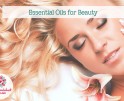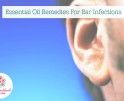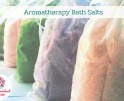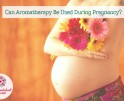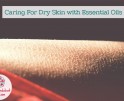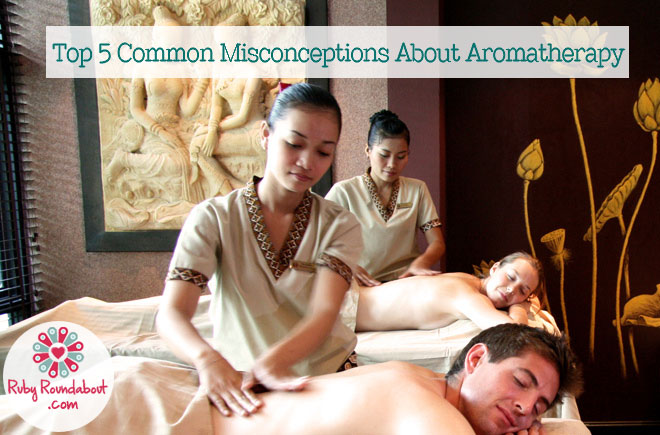
Top 5 Common Misconceptions About Aromatherapy
Despite being around for thousands of years, there is still a lot of confusion about Aromatherapy. Here are 5 of the biggest misconceptions plaguing this age-old practice that utilises Mother Nature’s gifts to bring balance back to body, mind and spirit.
All Essential Oils Are Created Equal

There is much debate over the use of the term ‘therapeutic grade’, when it comes to essential oils. While governing bodies vary from country to country, and the quality of some essential oils may not be as ‘organic’ as claimed, there are certain words to look out for when shopping for your Aromatherapy supplies. Avoid any oil that uses the words “Fragranced Oil”, “Perfumed Oil”, “Parfume”, “Natural Fragrance” and “Nature Identical Oil”. These synthetic oils are full of harmful chemicals and bear absolutely no resemblance to properly distilled all-natural essential oils.
Although essential oils don’t have a permanent shelf-life, they can last for several years if stored correctly. Be wary of anyone who sells essential oils in a clear, or plastic bottle. When exposed to sunlight the oils will degrade, and due to their volatile nature they also break down plastic, which also causes the oil to become contaminated and deteriorate.
Some essential oils will naturally be more expensive then others, due in large part to the amount of petals, leaves or bark needed for the distillation process. It takes approximately 65-roses to create 1-drop of pure rose otto essential oil, while it takes considerably less of the lavender or rosemary plant to create the equivalent. Be very suspicious if you see essential oils such as rose, jasmine and neroli for bargain basement prices.
One Scent To Rule Them All
Aromatic preference is a personal thing. When it comes to addressing a specific complaint some oils are more suitable then others, but the oil chosen always comes down to the one whose aroma you like best. Lavender is probably the most famous of all the essential oils, continually raved about for it’s relaxing, calming and stress-relieving properties. It certainly is a wonderfully soothing oil for the mind and body, but not if it reminds you of your Great-Auntie Doris who made you polish silverware and sort and iron her doily collection every summer holiday for 12-years of your life.
This is what is so special about Aromatherapy. It works more deeply then the physical body – it works on the mind and spirit as well, conjuring images, memories and deep-seated emotions to promote healing and balance on a profound level. So while one person may respond positively to a certain aroma, it can have the opposite effect for someone else. When working with oils, do your research but also go with your heart and choose the ones that you feel a connection with.
It’s More Of A Woman’s Thing
Absolutely not! Aromatherapy is a fantastic treatment that benefits both men and women equally. While essential oils such as rose, geranium, benzoin and ylang ylang are generally seen as being more appealing to women, that doesn’t mean men can’t or won’t enjoy the beautiful aromas, and benefits, of these oils. Traditionally oils such as sandalwood, cedarwood, patchouli, black pepper, juniper and vetiver are more commonly used with men, but the beauty of aromatherapy is that when all is said and done, it comes down to personal preference and personal associations with the individual scents.
It’s Natural, So It Must Be Safe
Unfortunately there is still a misconception around the fact that because something is natural it’s completely safe. This simply isn’t true, in fact essential oils are incredibly powerful and have the ability to cause serious harm if used incorrectly. One of the biggest things to keep in mind is that as a natural treatment, Aromatherapy needs time to take effect. For example, if you’re using a lavender compress to combat a headache, you will need to take time out and allow the oil to do its work. Adding half a bottle of the essential oil to your compress won’t make it work any faster! What you must consider is whether taking a natural approach to your health and well-being is a priority.
Aromatherapy Should Be Avoided By Children, The Elderly and Pregnant Women
Sadly there is a misconception that Aromatherapy should not only be avoided by pregnant women, but that it’s also too powerful to be used safely with children and the elderly. This isn’t the case at all. In fact everyone can enjoy and benefit from essential oils as long as they are used responsibly and with care. If you are in any doubt always consult with a qualified Aromatherapist.
While there are many essential oils that are not suitable for children, several such as mandarin, lavender and roman chamomile are absolutely fine to use from the age of 6-months onwards and can be extremely beneficial for a range of childhood complaints such as nappy rash, colic, teething, earaches and tantrums. What’s important to remember is that children need a much weaker dilution then adults.
For an upset tummy or temper tantrum soother mix 1-drop lavender and 1-drop mandarin in 20ml of base oil for a massage blend. If your little one won’t go to sleep, mix 1-drop lavender and 1-drop roman chamomile in 2-Tablespoons of full fat or semi-skimmed milk or child-friendly liquid soap for a wonderful, sleepy-time bath blend. Just remember that a child’s body is continuing to develop and their skin is still delicate, so essential oils will have a much more powerful effect on them.
The same can also be said of the elderly. As we age our skin grows thin and more often then not our health is in a state of decline. Many seniors take medication, some of which like those used to thin the blood, lower cholesterol and lower blood pressure; could interact negatively with essential oils. When using essential oils with anyone regardless of their age it is vital to know of they are taking any medications, including herbal supplements and vitamins.
Much has been written on the use of Aromatherapy during pregnancy. Although there is still some debate, the general consensus is that provided they are used with caution certain oils are perfectly safe to use, especially after the first trimester, but the dilution should be very weak. 1-drop of lavender used in a warm compress can help alleviate painful backache, while 1-drop of geranium in 1-Tablespoon of base oil in the bath can help ease the discomfort of sore, swollen ankles and legs. As always, when it comes to essential oils be smart and seek professional advice if in any doubt.
Essential Oils Can Be Taken Internally
No! No! A thousand times no! While rosemary, basil, ginger, cinnamon, lemongrass and thyme may get the taste buds tingling with thoughts of culinary delights, it is extremely important to understand that essential oils are completely different from the herbs and spices that fill our cupboards. In order to extract essential oil an aromatic plant, such as lavender, must go through a distillation process. The resulting oil is a highly concentrated substance, with one-drop being approximately 100-times more powerful then its herbal counterpart. Ingesting essential oils is very, very dangerous and can result in severe injuries, even death.
Some Aromatherapy enthusiasts have even suggested placing a drop or two of peppermint oil in a hot mug of water to combat indigestion, or a drop of lemon to help beat a cold. Of course using essential oils is a great way to support the body as well as the mind and spirit, but a safe and common sense approach is needed. Use the oils responsibly through massage, bath blends, aroma burners, sprays, compresses and steam inhalations. If you are suffering from an upset stomach, or feel the onset of a cold you are much better off using fresh peppermint leaves or freshly squeezed lemon juice in your mug of hot water.
Magic Cure
Let’s face it; we live in an over-medicated world. Everywhere you turn there seem to be pills for every single type of ailment and concern whether it be headaches, insomnia, stress, IBS, psoriasis, thinning hair and the list goes on and on. Chronic stress is often an underlying cause of several health issues, and sadly many of us are now so accustomed to stress we no longer know, or understand, what it feels like to fully relax.
When we are stressed our bodies go through a series of changes called ‘The Fight or Flight Response.’ This primal reaction is meant to protect us from real threats and danger, however nowadays it can be triggered by traffic jams, automated phone services, long queues at the supermarket and rude parking attendants. There is no question a little bit of stress is good for us, but the majority of us are now living in a continual state of stress and this is having a detrimental affect on our health and well-being.
Aromatherapy can help to alleviate many of the symptoms of stress as well as target the stress itself. It is a wonderful treatment that supports and works naturally with your body, bringing it back into a state of balance, where optimum health is achieved. It must be noted, however, that Aromatherapy is not a magical cure and should never, under any circumstances, replace medical treatment. This doesn’t mean you can’t still benefit from the power of essential oils, but in the case of serious medical conditions it is important to discuss treatment with your GP, as well as a qualified Aromatherapist.
Recommended
-
Essential Oils for BeautyJune 26th, 2015
-
Essential Oil Remedies For Ear InfectionsJune 1st, 2015
-
Aromatherapy Bath SaltsDecember 3rd, 2014
-
Can Aromatherapy Be Used During Pregnancy?November 26th, 2014
-
Caring For Dry Skin with Essential OilsNovember 19th, 2014

